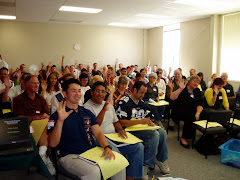
Without a doubt the most common quality high performers have amongst each other, irrespective of backgrounds or careers, is the innate ability to come back after a setback.
No matter how big, bad, awful or horrendous you may call it at the time. The ability for you to "come back" after a setback is paramount for long term success.
Failed once or twice in a professional context have you? Made a mistake or 3 in your lifetime, so far? Screwed up and thought you were a screw up? Made the same mistake more than once?
So... hands up if you've made a mistake? Keep your hands up if you've woken up beside a mistake! (Joke! - for some it may be true tho!)
Ok - seriously though. Doesn't it hurt a little or a lot when you make a mistake? After all, if making a mistake didn't hurt it wasn't that important to you - was it?
Personally I've made my fair share of mistakes, setbacks and general run of the mill, screw-ups!!! The good news is, I have many more to make!
Learning Requires It
The pathway to success demands of us to make mistakes and experience failure. It also demands of us to review our progress and make necessary changes to improve our performance. Our ability to overcome setbacks, as I mentioned earlier, determines the level of success we have or not.
This is pretty straight forward yet often hard to remember when we are caught in our awareness of having lost, failed or made a mistake. Especially if it was in the process of doing something we consider highly important to us. Be assured - no long term progress can be achieved without making mistakes and overcoming them.
Bouncing Back
Facing failure favourably requires a specific mind set which I want to highlight here the key features that must be present to bounce back from any setback. They are people who:
- Know that making mistakes is an integral part of the learning process.
- Know that learning from the mistake and making corrective changes ensures progress
- They are kind on themselves when they make a mistake (not being demeaning with themselves when using self-talk)
- Know that a failure is nothing more than a temporary experience
- That failure is not permanent
- That failure is specific to the task they have attempted and NOT an indication that other areas of their lives will be affected (They isolate the mistake)
- That failure or mistakes says nothing about them as a human being
- Their failure is nothing more than feedback based on what they have done and can be learnt from for continuous long term improvement to occur
- They are only momentarily ruffled, gutted or pissed off about making the mistake.
- They quickly make adjustments in behaviour or attitude to right the mistake
- They remain constantly focused on the long term goal they wish to achieve
- They know that making mistakes is part of the journey and positively embrace mistake making (Yahoo - look at how badly I messed up!)
- That failure is what they do not who they are. (Behaviour & Identity as separate entities yet connected)
- That their behaviour is an expression of who they are and does not define them as a person
Go over each of these points and identify which point/s you find difficult to accept. This exercise will help you identify where you are to focus your energy. Once you've identified the points that you struggle with begin to entertain that the point/s is a reality for you. Entertain the idea that this is possible and as a result of that, what else is possible for you if you were to embrace that point and any other I've listed. Keep considering how that point can benefit you in the midst of a setback scenario. Remember these are the qualities and principles that people who have had radical setbacks in their lives, use and as a result of using them, make unbelievable comebacks from. Rising above and beyond what may have intially appeared to be insurmountable odds. They are human. Just like you. And therefore, if they can use these points to make a come back then (guess what?) so can YOU!

No Better Time Than NOW
Don't wait any longer - identify what you need to add into your bounce back attitude and begin to act on it as a certainty for you. Notice how you are more resilient now.
If you new these principles and acted on them would past hurts have been easier to overcome? Should you face (and you will) more setbacks, screw-ups and mistakes in the near future. Will you be able to then, rise above them, and move on faster than usual?
Ok - enough said.
I assure you I have much more to say about this subject. For now you have enough to overcome the initial hurt of making mistakes or failing. The most common thing I see that stops people from moving on when they've screwed up and stay down longer than they need to. Is their ability to put themselves down and continue to ridicule themselves (time and time again) about having made a mistake, long after it has happened. Sadly, some have done this for a lifetime. Don't allow this to be you.
Follow the points I've listed above and share them with others.
Thumbs up for your continued progress when faced with failure, mistakes, setbacks and every day screw ups!
P.S. The sooner Organisation's celebrate mistakes and ensure staff have a safe environment where mistakes can be learnt from. The sooner we will overcome the "cover my own arse" attitude that many Businesses, Organisations and Government Departments have. All because they have created a culture where it is "unsafe" for staff or management to make, and own mistakes they've made!!!

















































No comments:
Post a Comment